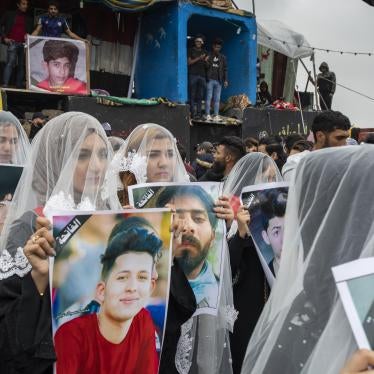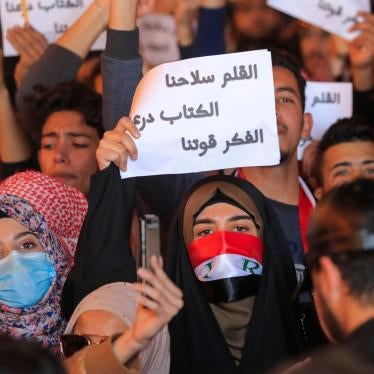The U.S. military is failing to conduct proper investigations into civilian deaths resulting from the excessive or indiscriminate use of force in Baghdad, Human Rights Watch charged in a new report released today.
The 56-page report, Hearts and Minds: Post-War Civilian Casualties in Baghdad by U.S. Forces, confirms twenty deaths in the Iraqi capital alone between May 1 and September 30. In total, Human Rights Watch collected credible reports of 94 civilian deaths in Baghdad, involving questionable legal circumstances that warrant investigation. This number does not include civilians wounded by U.S. troops. The precise number of Iraqi civilians killed by U.S. soldiers since the end of major military operations is unknown, and the U.S. military told Human Rights Watch that it keeps no statistics on civilian deaths.
“It’s a tragedy that U.S. soldiers have killed so many civilians in Baghdad,” said Joe Stork, acting executive director of the Middle East and North Africa division at Human Rights Watch. “But it’s really incredible that the U.S. military does not even count these deaths. Any time U.S. forces kill an Iraqi civilian in questionable circumstances, they should investigate the incident.”
Thus far, the military says it has concluded only five investigations above the division level, ordered by the deputy commanding general, into alleged unlawful deaths. Of these, soldiers were found to have operated “within the rules of engagement” in four cases. In the fifth case, a helicopter pilot and his commander face disciplinary action for trying to tear down a Shi`a banner in Sadr City in Baghdad, an incident that provoked a violent clash with demonstrators on August 13.
Human Rights Watch conducted its own investigation of two of these five cases, and found evidence to suggest that soldiers had used excessive force, including shooting a person who had his hands in the air and beating a detainee.
In some cases, U.S. forces faced a real threat, which gave them the right to respond with force. But that response was sometimes disproportionate or indiscriminate, harming civilians or putting them at risk.
“The cases we documented in this report reveal a pattern of over-aggressive tactics, excessive shooting in residential areas and hasty reliance on lethal force,” Stork said.
In compiling its report, Human Rights Watch conducted more than 60 interviews and gathered information from five sources: Iraqi witnesses and family members of victims, police records from all the police stations in Baghdad, local and international human rights groups, media accounts, and the U.S. military.
The Human Rights Watch report categorizes civilian deaths in Baghdad since May 1 in three basic groups: during raids, at checkpoints, and after ambushes on convoys. In all three circumstances, soldiers often quickly resorted to the use of lethal force. Their fire was not always directed at the intended target, or proportionate to the threat.
“Iraq is clearly a hostile environment for U.S. troops,” said Stork. “But that does not absolve the military from its legal obligations to use force in a restrained and proportionate manner – and only when necessary.”
Part of the problem is the deployment of combat troops, such as the 82nd Airborne Division and the 1st Armored Division, for essentially law enforcement tasks. Many of these soldiers fought their way into Iraq and were then asked to switch from acting as warriors to serving as policemen who must control crowds, pursue thieves and root out insurgents. For these policing tasks they are not properly trained, equipped or psychologically prepared.
In some cases, U.S. soldiers have behaved with unnecessary rudeness toward Iraqi civilians. Human Rights Watch strongly recommended that U.S. forces desist from the practice of putting their feet on the heads of Iraqis whom they have detained face-down on the ground. In Iraqi culture, the use of feet against another person is highly insulting and offensive.
U.S. military officials told Human Rights Watch they were providing extra training for U.S. forces. Human Rights Watch researchers met many U.S. military personnel who dealt respectfully with Iraqis and were working hard to train Iraqi police, guard facilities and pursue criminals. Some of these soldiers expressed frustration at the behavior of their colleagues.
“It takes a while to get the Rambo stuff out,” one officer told Human Rights Watch.
In the meantime, the lack of timely and high-level investigations into many questionable incidents has created an atmosphere of impunity.
“Soldiers must know they will be held accountable for the improper use of force,” Stork said. “Right now, soldiers feel they can pull the trigger without coming under review.”
The Human Rights Watch report proposed concrete ways to reduce civilian deaths in Iraq. Checkpoints should be better marked with signs in Arabic and lights, and interpreters should accompany all raids. The military’s rules of engagement are not made public due to security concerns, but Iraqi civilians have a right to know how they are expected to behave at checkpoints and during raids. Coalition forces should make such information available through the local media, Human Rights Watch urged.
Most importantly, U.S. military authorities should investigate all credible allegations of unlawful killings by coalition soldiers, and punish soldiers and commanders found to have used or tolerated the use of excessive or indiscriminate force.






